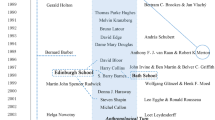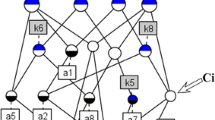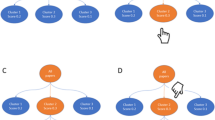Abstract
For conducting a literature review is necessary a preliminary organization of the available bibliographic material. In this article, we present a novel method called OrgBR-M (method to organize bibliographic references), based on the formal concept analysis theory, to assist in organizing bibliographic material. Our method systematizes the organization of bibliography and proposes metrics to assist in guiding the literature review. As a case study, we apply the OrgBR-M method to perform a literature review of the educational data mining field of study.









Similar content being viewed by others
Notes
Conexp: http://conexp.sourceforge.net/.
Conexp: http://conexp.sourceforge.net/.
References
Ganter, B., Wille, R.: Formal Concept Analysis: Mathematical Foundations, 1st edn. Springer, New York (1997)
Ganter, B., Stumme, G., Wille, R.: Formal concept analysis: theory and applications. J. Univ. Comput. Sci. 10(8), 955 (2004). https://doi.org/10.3217/jucs-010-01
Wille, R.: In Formal Concept Analysis. In: Ganter, B., Stumme, G., Wille, R. (eds.) Lecture Notes in Computer Science, vol. 3626, pp. 1–33. Springer, Berlin (2005). https://doi.org/10.1007/11528784_1
Ganter, B., Stumme, G., Wille, R.: Formal Concept Analysis, Foundations and Applications. Lecture Notes in Computer Science, vol. 3626. Springer, Berlin (2005)
Altinel, B., Ganiz, M.C.: Semantic text classification: a survey of past and recent advances. Inf. Process. Manag. 54(6), 1129 (2018). https://doi.org/10.1016/j.ipm.2018.08.001
Huynh, T., Takasu, A., Masada, T., Hoang, K.: Collaborator recommendation for isolated researchers, pp. 639–644 (2014). https://doi.org/10.1109/WAINA.2014.105
Rodrigues M.W., Brandão, W.C., Zárate L.E.: Recommending scientific collaboration from researchgate. In: Proceedings of the 7th Brazilian Conference on Intelligent systems (Sociedade Brasileira de Computação (SBC)), BRACIS’18, pp. 1–6 (2018). https://doi.org/10.1109/BRACIS.2018.00065
Gipp, B., Beel, J., Hentschel, C.: Scienstein: A research paper recommender. In: Proceedings of the International Conference on Emerging Trends in Computing (ICETiC’09), ICETiC’09, pp. 309–315 (2009)
Galgani, F., Compton, P., Hoffmann, A.: Summarization based on bi-directional citation analysis. Inf. Process. Manag. 51(1), 1 (2015). https://doi.org/10.1016/j.ipm.2014.08.001
Villegas, N.M., Sánchez, C., Díaz-Cely, J., Tamura, G.: Characterizing context-aware recommender systems: a systematic literature review. Knowl.-Based Syst. 140, 173 (2018). https://doi.org/10.1016/j.knosys.2017.11.003
Raamkumar, A.S., Foo, S., Pang, N.L.S.: Rec4lrw-scientific paper recommender system for literature review and writing. Front. Artif. Intell. Appl. 275, 106 (2015). https://doi.org/10.3233/978-1-61499-503-6-106
Raamkumar, A.S., Foo, S., Pang, N.: A framework for scientific paper retrieval and recommender systems. CoRR abs/1609.01415 (2016)
Nart, D.D., Tasso, C.: A personalized concept-driven recommender system for scientific libraries. Procedia Comput. Sci. 38, 84 (2014). https://doi.org/10.1016/j.procs.2014.10.015
Tho, Q.T., Hui, S., Fong, A.: A citation-based document retrieval system for finding research expertise. Inf. Process. Manag. 43(1), 248 (2007). https://doi.org/10.1016/j.ipm.2006.05.015
Poelmans, J., Ignatov, D.I., Viaene, S., Dedene, G., Kuznetsov, S.O.: Text Mining Scientific Papers: A Survey on FCA-Based Information Retrieval Research, pp. 273–287. Springer, Berlin (2012). https://doi.org/10.1007/978-3-642-31488-9_22
Alencar, R.O.d., Zarate, L., Song, M.: Sphere-m: An ontology capture method, pp. 353–358 (2012). https://doi.org/10.1109/ICSMC.2012.6377726
Sowa, J.F.: Knowledge Representation: Logical, Philosophical, and Computational Foundations, vol. 27. Brooks Cole Publishing Co., Pacific Grove (1999). https://doi.org/10.1162/089120101750300544
Yevtushenko, S.A.: System of data analysis concept explorer. In: Proceedings of the 7th National Conference on Artificial Intelligence KII-2000, pp. 127–134 (2000)
Neto, S.M., Zárate, L.E., Song, M.A.: Handling high dimensionality contexts in formal concept analysis via binary decision diagrams. Inf. Sci. 429, 361 (2018). https://doi.org/10.1016/j.ins.2017.11.028
Rodrigues, M.W., Isotani, S., Zárate, L.E.: Educational data mining: a review of evaluation process in the e-learning. Telem. Inform. 35(6), 1701 (2018). https://doi.org/10.1016/j.tele.2018.04.015
Kitchenham, B., Pearl Brereton, O., Budgen, D., Turner, M., Bailey, J., Linkman, S.: Systematic literature reviews in software engineering - a systematic literature review. Inf. Software Technol. 51(1), 7 (2009). https://doi.org/10.1016/j.infsof.2008.09.009
Chen, C.M., Chen, Y.Y., Liu, C.Y.: Learning performance assessment approach using web-based learning portfolios for e-learning systems. IEEE Trans. Syst. Man Cybern. C: Appl. Rev. 37(6), 1349 (2007). https://doi.org/10.1109/TSMCC.2007.900641
Erosa, V., Arroyo, P.: Technology and knowledge: enhancing the education frontiers, pp. 1501–1507 (2007). https://doi.org/10.1109/PICMET.2007.4349471
Liu, F.J., Shih, B.J.: Learning activity-based e-learning material recommendation system, pp. 343–348 (2007). https://doi.org/10.1109/ISM.Workshops.2007.64
Romero, C., Ventura, S.: Educational data mining: a survey from 1995 to 2005. Expert Syst. Appl. 33(1), 135 (2007). https://doi.org/10.1016/j.eswa.2006.04.005
Richardson, B., Davis, K., Beach, M.: Introducing data mining techniques and software engineering to high school science students, pp. 1–6 (2008). https://doi.org/10.1109/FIE.2008.4720456
Hongxia, J., Yao, H.: Classroom teaching quality evaluation based on neuro-fuzzy id3 algorithm 1, 166 (2008). https://doi.org/10.1109/ISCID.2008.127
Caballe, S., Xhafa, F., Abraham, A.: Towards an automatic real-time assessment of online discussions in computer-supported collaborative learning practices, pp. 470–475 (2008). https://doi.org/10.1109/ICDIM.2008.4746758
Fernández-Luna, J.M., Huete, J.F., MacFarlane, A., Efthimiadis, E.N.: Teaching and learning in information retrieval. Inf. Retr. 12(2), 201 (2009). https://doi.org/10.1007/s10791-009-9089-9
Hsieh, J.C., Chen, C.M., Lin, H.F.: Social interaction mining based on wireless sensor networks for promoting cooperative learning performance in classroom learning environment, pp. 219–221 (2010). https://doi.org/10.1109/WMUTE.2010.22
Kechaou, Z., Ben Ammar, M., Alimi, A.: Improving e-learning with sentiment analysis of users’ opinions, pp. 1032–1038 (2011). https://doi.org/10.1109/EDUCON.2011.5773275
Sachin, R., Vijay, M.: A survey and future vision of data mining in educational field, pp. 96–100 (2012). https://doi.org/10.1109/ACCT.2012.14
Ivancevic, V., Celikovic, M., Lukovic, I.: The individual stability of student spatial deployment and its implications, pp. 1–4 (2012)
Li, Y., Mei, L., Wang, J.: A personalized recommendation system in e-learning environment based on semantic analysis, pp. 802–807 (2012)
Baradwaj, B.K., Pal, S.: Mining educational data to analyze students’ performance. CoRR abs/1201.3417 (2012). https://doi.org/10.13189/wjcat.2014.020203
Liu, Q., Peng, Y.: A method of unstructured information process in computer teaching evaluation system based on data mining technology, pp. 688–692 (2013). https://doi.org/10.1109/CSNT.2013.147
Leelathakul, N., Chaipah, K.: Quantitative effects of using facebook as a learning tool on students’ performance, pp. 87–92 (2013). https://doi.org/10.1109/JCSSE.2013.6567325
Harfield, A., Jormanainen, I., Rungrattanaubol, J., Pattaranit, R.: An open monitoring environment for primary school children engaged in tablet-based learning, pp. 195–199 (2013). https://doi.org/10.1109/JCSSE.2013.6567344
França, R.S.d., Amaral, H.J.C.d.: Mineraç ao de dados na identificaç ao de grupos de estudantes com dificuldades de aprendizagem no ensino de programaç ao, RENOTE: Revista Novas Tecnologias na Educaç ao 11(1) (2013). http://seer.ufrgs.br/renote/article/view/41634/26413
Huebner, R.A.: A survey of educational data-mining research. Res. High. Educ. J. 19(4) (2013). http://www.aabri.com/manuscripts/121328.pdf
Jindal, R., Borah, M.D.: A survey on educational data mining and research trends. Int. J. Database Manag. Syst. 5(3), 53 (2013). http://airccse.org/journal/ijdms/papers/5313ijdms04.pdf
Mohamad, S.K., Tasir, Z.: Educational data mining: a review. In: The 9th International Conference on Cognitive Science, vol. 97, p. 320 (2013). https://doi.org/10.1016/j.sbspro.2013.10.240. Procedia - Social and Behavioral Sciences
Gray, G., McGuinness, C., Owende, P.: Investigating the efficacy of algorithmic student modelling in predicting students at risk of failing in tertiary education, pp. 378–380 (2013)
Liu, Y.E., Mandel, T., Butler, E., Andersen, E., O’Rourke, E., Brunskill, E., Popović, Z.: Predicting player moves in an educational game a hybrid approach, pp. 106–113 (2013)
Pardos, Z.A., Bergner, Y., Seaton, D.T., Pritchard, D.E.: Adapting bayesian knowledge tracing to a massive open online course in edx. In: D’Mello, S.K., Calvo, R.A., Olney A. (eds.) Proceedings of the 6th International Conference on Educational Data Mining, International Educational Data Mining Society, pp. 137–144 (2013)
Maldonado, R.M., Yacef, K., Kay, J.: Data mining in the classroom discovering groups strategies at a multi-tabletop environment. In: Proceedings of the 6th International Conference on Educational Data Mining (Interntional Educational Data Mining Society), pp. 121–128 (2013)
Almeda, M.V., Scupelli, P., Baker, R.S., Weber, M., Fisher, A.: Clustering of design decisions in classroom visual displays, pp. 44–48 (2014). https://doi.org/10.1145/2567574.2567605
Guleria, P., Sood, M.: Data mining in education: a review on the knowledge discovery perspective. Int. J. Data Min. Knowl. Manag. Process 4(5), 47 (2014). https://doi.org/10.5121/ijdkp.2014.4504
Paiva, R., Borges, D., Santos, J., Bittencourt, I.I., da Silva, A.P.: Lessons learned from an online open course: a Brazilian case study, pp. 229–234 (2014). https://doi.org/10.1145/2554850.2555024
Pena-Ayala, A.: Educational data mining: a survey and a data mining-based analysis of recent works. Expert Syst. Appl. 41(4), 1432 (2014). https://doi.org/10.1016/j.eswa.2013.08.042
Tashakkori, R.M., Parry, R.M., Benoit, A., Cooper, R.A., Jenkins, J.L., Westveer, N.T.: Research experience for teachers: Data analysis & mining, visualization, and image processing, pp. 193–198 (2014). https://doi.org/10.1145/2538862.2538967
Guarín, C.E.L., Guzmán, E.L., González, F.A.: A model to predict low academic performance at a specific enrollment using data mining. IEEE Revista Iberoamericana de Tecnologias del Aprendizaje 10(3), 119 (2015). https://doi.org/10.1109/RITA.2015.2452632
Heredia, D., Amaya, Y., Barrientos, E.: Student dropout predictive model using data mining techniques. IEEE Latin Am. Trans. 13(9), 3127 (2015). https://doi.org/10.1109/TLA.2015.7350068
Ihantola, P., Vihavainen, A., Ahadi, A., Butler, M., Börstler, J., Edwards, S.H., Isohanni, E., Korhonen, A., Petersen, A., Rivers, K., Rubio, M.A., Sheard, J., Skupas, B., Spacco, J., Szabo, C., Toll, D.: Educational data mining and learning analytics in programming: Literature review and case studies, pp. 41–63 (2015). https://doi.org/10.1145/2858796.2858798
London, A., Pelyhe, A., Holló, C., Németh, T.: Applying graph-based data mining concepts to the educational sphere, pp. 358–365 (2015). https://doi.org/10.1145/2812428.2812436
In: O.C. Santos, J.G. Boticario, C. Romero, M. Pechenizkiy, A. Merceron, P. Mitros, J.M. Luna, C. Mihaescu, P. Moreno, A. Hershkovitz, S. Ventura, M. Desmarais (eds.) Proceedings of the 8th International conference on educational data mining (EDM’15), International Conference on Educational Data Mining (EDM) 2015 (International Educational Data Mining Society (IEDMS)), pp. 282–288
Gramoli, V., Charleston, M., Jeffries, B., Koprinska, I., McGrane, M., Radu, A., Viglas, A., Yacef, K.: Mining autograding data in computer science education (2016). https://doi.org/10.1145/2843043.2843070
Romero, C., Ventura, S.: Educational data mining: a review of the state of the art. IEEE Trans. Syst. Man Cybern. C 40(6), 601 (2010). https://doi.org/10.1109/TSMCC.2010.2053532
Ricarte, I.L.M., Junior, G.R.F.: Uma metodologia para a mineraç ao de dados oriundos de ambientes de aprendizagem apoiados por computadores. Revista Informática na Educaç ao: Teoria e Prática 14(2), 83 (2011)
Vasconcelos, F.H.L., da Silva, T.E.V., Mota, J.C.M.: Multilinear educational data analysis for evaluation of engineering education. IEEE Latin Am. Trans. 13(8), 2785 (2015). https://doi.org/10.1109/TLA.2015.7332163
Gobert, J.D., Kim, Y.J., Pedro, M.A.S., Kennedy, M., Betts, C.G.: Using educational data mining to assess students’ skills at designing and conducting experiments within a complex systems microworld. Think. Skills Creat. 18, 81 (2015). https://doi.org/10.1016/j.tsc.2015.04.008
Allen, L., McNamara, D.: You are your words: modeling students’ vocabulary knowledge with natural language processing techniques, pp. 258–265 (2015)
Pedro, M.O.S., Snow, E., Baker, R., McNamara, D., Heffernan, N.: Exploring dynamical assessments of affect, behavior, and cognition and math state test achievement, pp. 85–92 (2015)
Shahiri, A.M., Husain, W., Rashid, N.A.: A review on predicting student’s performance using data mining techniques. Procedia Comput. Sci. 72, 414 (2015). https://doi.org/10.1016/j.procs.2015.12.157
Campagni, R., Merlini, D., Sprugnoli, R., Verri, M.C.: Data mining models for student careers. Expert Syst. Appl. 42(13), 5508 (2015). https://doi.org/10.1016/j.eswa.2015.02.052
Hung, Y.H., Chang, R.I., Lin, C.F.: Hybrid learning style identification and developing adaptive problem-solving learning activities. Comput. Hum. Behav. A 552, 55 (2016). https://doi.org/10.1016/j.chb.2015.07.004
Sabourin, J., Kosturko, L., Fitzgerald, C., Mcquiggan, S.: Student privacy and educational data mining: perspectives from industry. In: Santos, O.C., Boticario, J.G., Romero, C., Pechenizkiy, M., Merceron, A., Mitros, P., Luna, J.M., Mihaescu, C., Moreno, P., Hershkovitz, A., Ventura, S., Desmarais, M. (eds.) Proceedings of the 8th International Conference on Educational Data Mining (EDM’15), (International Educational Data Mining Society (IEDMS), pp. 164–170 (2015)
Pedro, M.O.Z.S., Baker, R.S., Bowers, A.J., Heffernan, N.T.: Predicting college enrollment from student interaction with an intelligent tutoring system in middle school. In: D’Mello, S.K., Calvo, R.A. Olney, A. (eds.) Proceedings of the 6th international conference on educational data Mining (EDM’15), International Educational Data Mining Society, pp. 137–144 (2013)
Olsen, J., Aleven, V., Rummel, N.: Predicting student performance in a collaborative learning environment. In: Santos, O.C., Boticario, J.G., Romero, C., Pechenizkiy, M., Merceron, A., Mitros, P., Luna, J.M., Mihaescu, C., Moreno, P., Hershkovitz, A., Ventura, S., Desmarais, M. (eds.) Proceedings of the 8th international conference on educational data mining (EDM’15), International Conference on Educational Data Mining (EDM) 2015, (International Educational Data Mining Society (IEDMS), pp. 211–217 (2015)
Deerwester, S., Dumais, S.T., Furnas, G.W., Landauer, T.K., Harshman, R.: Indexing by latent semantic analysis. J. Am. Soc. Inf. Sci. 41(6), 391 (1990). https://doi.org/10.1002/(SICI)1097-4571(199009)41:6<391::AID-ASI1>3.0.CO;2-9
Bellegarda, J.R.: Latent semantic mapping. IEEE Signal Process. Mag. 22(5), 70 (2005). https://doi.org/10.1109/MSP.2005.1511825
Landauer, T.K.: A solution to plato’ s problem: The latent semantic analysis theory of acquisition, induction, and representation of knowledge. Psychol Rev 104, 211 (1997). https://doi.org/10.1037/0033-295X.104.2.211 (1997)
Recchia, G., Jones, M.N.: More data trumps smarter algorithms: Comparing pointwise mutual information with latent semantic analysis. Behavior Research Methods 41(3), 647 (2009). https://doi.org/10.3758/BRM.41.3.647
Budiu, R., Royer, C., Pirolli, P.L.: Modeling information scent: a 1446 comparison of lsa, pmi and glsa similarity measures on common 1447 tests and corpora. In: 8th Annual Conference of the Recherche d’Information Assistee Par Ordinateur (RIAO’), Pittsburgh, PA, USA (2005)
Acknowledgements
The authors acknowledge the financial support received from the CNPq (Brazilian National Council for Scientific and Technological Development), CAPES (Coordination for the Improvement of Higher Education Personnel), FAPEMIG (Foundation for Research Support of the State of Minas Gerais), and Pontifical Catholic University of Minas Gerais, Brazil.
Author information
Authors and Affiliations
Corresponding author
Additional information
Publisher's Note
Springer Nature remains neutral with regard to jurisdictional claims in published maps and institutional affiliations.
Rights and permissions
About this article
Cite this article
Rodrigues, M.W., Zárate, L.E. OrgBR-M: a method to assist in organizing bibliographic material based on formal concept analysis—a case study in educational data mining. Int J Digit Libr 21, 423–448 (2020). https://doi.org/10.1007/s00799-020-00290-8
Received:
Revised:
Accepted:
Published:
Issue Date:
DOI: https://doi.org/10.1007/s00799-020-00290-8




